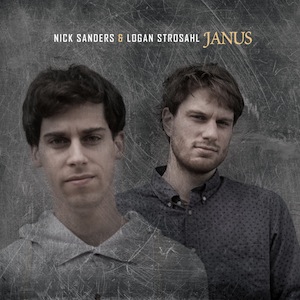Label/Year: Sunnyside Records, 2017
Lineup - Logan Strosahl: alto saxophone, narration; Michael Sachs: clarinets; Sam Decker: tenor saxophone; Aquiles Navarro: trumpet; Nick Sanders: piano; Henry Fraser: bass; Connor Baker: drums; Julia Easterlin: narration.
I first came across with the music of saxophonist Logan Strosahl last year, when I got the album Janus, recorded in duo with the pianist Nick Sanders, also a member of his Team collective group. I was very well impressed with the connectedness and genre bending adopted by the talented pair of musicians, who join forces with five other musicians to devise Book I of Arthur, the first of a planned set of three chapters inspired on the legendary King Arthur.
The session opens with “Prologue: In Nomine”, which introduces the tale with devoted medieval classical orientations. These cordial tones become frenzied in the introductory horn-driven exaltation of the following piece, “Wherein the Beast Is Ever More and More”. The ways of the troubadour come back shortly later to sustain the atmosphere with a properly cadenced piano accompaniment and multiple reed lines atop.
Strosahl expressively narrates “Uther Pendragon and the Birth of Arthur”, having changeable textures propagating in the background and enveloping the story with a strong cinematic sense.
A feisty and intense rhythm, projected with the force and passion of Sanders’ wanders and the sturdy bass-drum flow, initially takes over “Igraine Gives the Infant Arthur to Ector”, which decreases when the vigor is forever put to a halt to emphasize soaring, introspective moments delineated by clarinet and bowed bass.
If “The Woods So Wild” is shaped like a folk dance and filled with contrapuntal horn movements and dynamic pulse, the surprising “Narratio: Turn Thou Us...” goes from a gently-handled, pure classical approach to a fiery collective unfolding that hits hard on the ears.
“Battle of Bedegraine” and “Prooemium” provide some of the finest moments. The former, narrated by Julia Easterlin, develops with sharp angles and protuberances in the melody, acquiring depth by the presence of low-toned piano voicings and boosted by rampant saxophone incursions and trumpet stunts, which I wish would be further explored. The latter piece boasts lush harmonic sequences and a strapping improvisation by the bandleader before finishing in another collective manifestation.
This chapter culminates in the form of a conquering celebration where the knightly posture is recuperated within a monophonic classical arrangement.
Operating in his comfort zone, which encompasses both the jazz and classical genres, Strosahl takes some risk by superimposing the spoken words to the music. Even not matching the previous Up Go We, this new album still brings some interesting ideas and particular moods to be discovered and appreciated.
Grade B-
Favorite tracks:
05 - Igraine Gives the Infant Arthur to Ector ► 09 - Battle of Bedegraine ►10 – Prooemium




